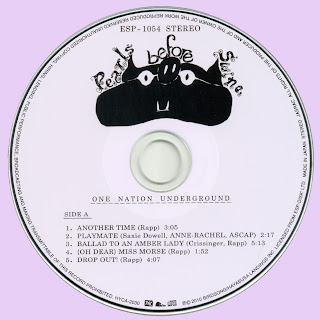It hardly endeared them to the establishment, including their own record label, Columbia. "There was," USA mastermind Joseph Byrd would later recount, "scant enthusiasm from the executives for a band whose name they hated, whose music they didn't understand, and whose politics they thought treasonous."
That sense of treason extended to their approach to popular music. These United States were a band of serious avant-gardists; young composers and scholars who were students of modern-composition titans John Cage and Karlheinz Stockhausen. Even though none had a background —or, even, a sensibility— in rock'n'roll, Byrd decided that they should try their hand at a rockband.
And they were like no band ever before assembled. Rather than electric guitar, The United States of America employed a bizarre arsenal of instruments: circus calliope, harpsichord, scrapes of atonal violin, a ring modular, and electronic oscillations all being used to assault the 'sacred' form of the rock'n'roll song.
It was part subversion, sure, but The United States of America weren't simple provocateurs. Listening to their one-and-only album —a 1968 self-titled album that sunk quickly without a trace— and what stands out isn't its sense of invention or its preponderance of experimentation, but the way that its experimental edge works with its surprising, charming tunefulness.
Whilst The United States continually deconstruct the sanctity of songs —passages of white noise, eerie atmospheres, and cacophonous collage derailing the forward progression of verse/chorus— they don't shy away from the sweetness of songcraft. With Dorothy Moskowitz's voice as their most melodic instrument, Byrd and his crew composed tunes that were tuneful; be they raucous, psychedelic rockers, or eerie, barely-there lullabies.
Since this album has been rediscovered by a new generation, it's those sparse songs that've most entranced modern audiences; the marriage of Moskowitz's gentle singing, scrapes and wails of Gordon Marron's violin, and sci-fi squalls of electric circuitry make for most modern-sounding compositions on cuts like "Cloud Song."
The influence of the spectral side is apparent on their biggest new-millennial boosters, Broadcast, the amazing English electro minimalists who've cited The United States of America as their chief influence. In many ways, this album makes more sense over 40 years on than it would've in its day; even if the band were an obvious product of their era.
by Anthony Carew
1. The American Metaphysical Circus (Joseph Byrd) - 4:56
2. Hard Coming Love (Joseph Byrd, Dorothy Moskowitz) - 4:41
3. Cloud Song (Joseph Byrd, Dorothy Moskowitz) - 3:18
4. The Garden Of Earthly Delights (Joseph Byrd, Dorothy Moskowitz) - 2:39
5. I Won't Leave My Wooden Wife For You, Sugar (Joseph Byrd, Dorothy Moskowitz) - 3:51
6. Where Is Yesterday (Gordon Marron, Ed Bogas, Dorothy Moskowitz) - 3:08
7. Coming Down (Joseph Byrd, Dorothy Moskowitz) - 2:37
8. Love Song For The Dead Che (Joseph Byrd) - 3:25
9. Stranded In Time (Gordon Marron, Ed Bogas) - 1:49
10.The American Way Of Love - 6:38
...Metaphor For An Older Man (Joseph Byrd)
...California Good Time Music (Joseph Byrd)
...Love Is All (Joseph Byrd, Dorothy Moskowitz, Rand Forbes, Craig Woodson, Gordon Marron) - 6:38
11.Osamu's Birthday (Joseph Byrd) - 2:59
12.No Love To Give (Dorothy Moskowitz) - 2:36
13.I Won't Leave My Wooden Wife For You, Sugar (Joseph Byrd, Dorothy Moskowitz) - 3:45
14.You Can Never Come Down (Joseph Byrd) - 2:32
15.Perry Pier (Dorothy Moskowitz) - 2:37
16.Tailor Man (Dorothy Moskowitz) - 3:06
17.Do You Follow Me (Kenneth Edwards) - 2:34
18.The American Metaphysical Circus (Joseph Byrd) - 4:01
19.Mouse (The Garden Of Earthly Delights) (Joseph Byrd, Dorothy Moskowitz) - 2:39
20.Heresy (Coming Down) (Joseph Byrd, Dorothy Moskowitz) - 2:32
The United States Of America
*Joseph Byrd – Eectric Harpsichord, Organ, Calliope, Piano
*Dorothy Moskowitz – Lead Vocals
*Gordon Marron – Electric Violin, Ring Modulator
*Rand Forbes – Electric Bass
*Craig Woodson – Electric Drums, Percussion
Guest Musician
*Ed Bogas – Occasional Organ, Piano, Valliope
Related Act





